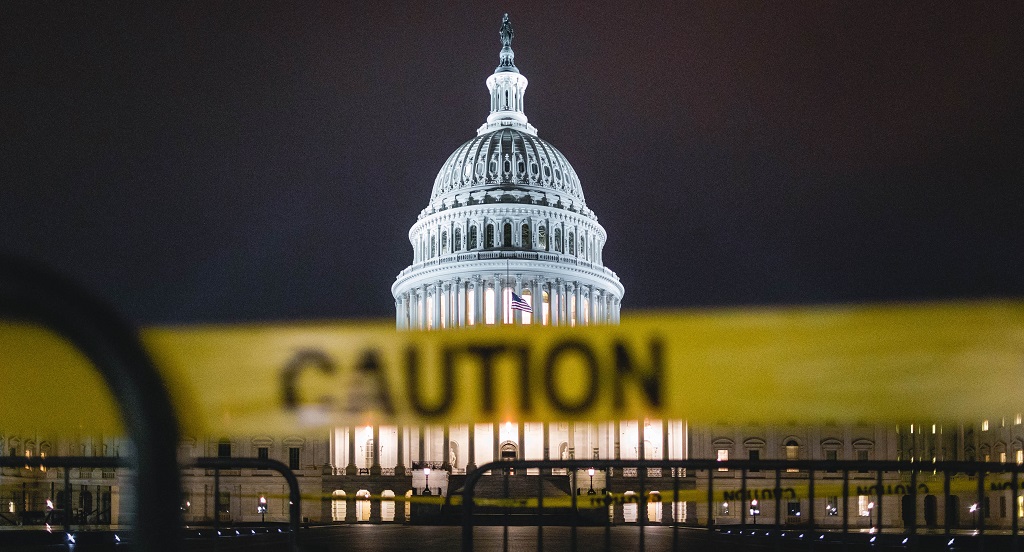After weeks of failed negotiations on spending, Congress has less than a week left to avert a potential government shutdown. Members of the House Republicans’ Freedom Caucus have refused to pass any spending bill for the Department of Homeland Security (DHS) unless it contains HR2, their massive overhaul of border and asylum laws, at a minimum. Similarly, House Republicans are currently holding back on the bill funding the Justice Department (which, in turn, funds the immigration court system) due to political disagreements with multiple criminal investigations against ex-President Trump. While negotiators have until September 30th to pass a short-term bill holding off a shutdown temporarily, a shutdown seems increasingly likely.
While it remains to be seen how long any potential shutdown might last, this guide is intended to explain what is likely going to happen across America’s immigration agencies should government funding lapse on October 1.
U.S. Citizenship and Immigration Services
Because USCIS is largely funded by fees paid by immigrants and their beneficiaries, most USCIS operations would continue as normal. Interviews for benefits applications, naturalization ceremonies, biometrics processing, and more should remain uninterrupted for the length of any potential shutdown. In September 2022, USCIS estimated that it would only have to furlough around 200 employees out of the agency’s roughly 19,000 staff.
However, there are a few key functions at USCIS that would be disrupted by a shutdown, including both the Conrad-30 program which brings doctors to the United States to work in rural areas and the E-Verify program, both of which are funded by Congress. If E-Verify were shut down temporarily, employers would still be required to verify I-9 documents through in-person inspection or through USCIS’s new alternate verification process. Unlike in previous years, where a shutdown impacted the EB-5 Regional Center Program for immigrant investors, the program is funded through 2027 and will not be impacted by any shutdown this year.
During previous shutdowns, E-Verify extended the period under which E-Verify compliance was required to ensure that failure to submit documentation to the system while not in operation would not lead to any penalty. However, a shutdown may impact some federal contractors who are required to use E-Verify and some employers in states which mandate the use of E-Verify during the hiring process.
Executive Office for Immigration Review
Immigration courts are heavily impacted by government shutdowns, as the agency raises only a small portion of its funding through fees. During previous shutdowns, all non-detained immigration court hearings have been suspended, and courts have not accepted new filings. It remains to be seen whether EOIR will continue to accept filings through its electronic system (ECAS), which did not exist during the previous shutdown.
The month-long 2018-2019 shutdown led EOIR to suspend between 80,000-94,000 cases in total. Any shutdown of a similar length occurring today would lead to substantially greater delays. Not only are there now over 250 more immigration judges on the bench than in 2018-2019, but that shutdown occurred over Christmas and New Year’s when multiple courts were already planning to close for the federal holidays.
Importantly, all detained immigration court hearings are likely to continue as normal during a shutdown, as they have in previous years. It remains to be seen whether this would also include credible fear review hearings for families put through the Biden administration’s new “Family Expedited Removal Management” program (FERM).
Immigration and Customs Enforcement
Most of the work carried out at ICE is considered to be “essential” and would continue without any significant impact, although the agency’s operations may be impacted by the furloughing of support staff in certain areas. In September 2022, ICE estimated that it would have to furlough around 3,500 out of its roughly 20,800 employees. Some of ICE’s “essential” functions include the operation of the Student and Exchange Visitor Information System (SEVIS), which has remained open during previous shutdowns. Individuals should still attend any ICE check-ins and comply with any directions from ICE that were issued prior to the shutdown.
U.S. Customs and Border Protection
As with ICE, CBP largely carries out “essential” operations and will remain open during a shutdown, although some services may be impacted by furloughed support staff throughout the agency. In September 2022, CBP estimated that around 5,000 out of its roughly 64,000 employees would be furloughed, with the vast majority of staff continuing to work without pay during a shutdown. In previous shutdowns, there have been noticeable delays in CBP adjudication of applications filed at the border (such as L-1 visas).
The impact of a government shutdown on migration at the southern border remains uncertain. While Border Patrol agents and CBP Officers will continue to operate as normal, there may be negative impacts from the loss of morale due to pay freezes and operational impacts from reduced support staff throughout the agency. It also remains to be seen how any reduced CBP adjudicatory capacity would impact migrant processing through the CBP One app, which did not exist during the last shutdown.
U.S. Department of State
Like USCIS, the State Department’s visa adjudication and consular services are largely fee-funded and should remain operational during any government shutdown. However, if there are insufficient fees to support consular services at a particular consulate or embassy, the post may limit services only to diplomatic visas and adjudication of standard applications only in “life or death” emergency situations.
FILED UNDER: Government Shutdown Immigration













